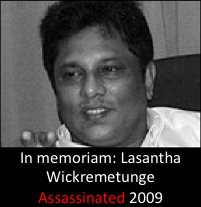
Maybe we are numb too
Though it’s warm
and all we have today
Is a cloudy sky
Death at Noon, Vivimarie Vanderpoorten
Lasantha Wickremetunge, the Editor of the Sunday Leader and one of Sri Lanka’s best known and most senior journalists, was killed in broad daylight one year ago. As we noted on the site a year ago,
Lasantha was 50 at the time of his assassination. No group to date has claimed responsibility. In a tremendously powerful and moving editorial published posthumously the Sunday after he was killed, Lasantha notes that “When finally I am killed, it will be the government that kills me.”
Groundviews published a number of articles, including poems by award winning poets, condemning the murder and celebrating his life. Lasantha’s murder was also the only occasion to date that we changed our homepage to black and white for a week, as a mark of protest and defiance.
In March 2009, we reproduced in full a letter from Sonali Samarasinghe, herself a senior journalist at the Sunday Leader, to the Inspector General of Police, asking him to record ‘very important details’ known to the Sri Lankan President and at least one other senior government minister, based on the minister’s own admission, pertaining to the identity of her husband Lasantha Wickremetunge’s killers. Groundviews was told that no newspaper in Sri Lanka was willing to carry this letter in full.
In a video produced by Groundviews to celebrate Human Rights Day 2009, Dilrukshi Handunnetti, who at the time of Lasantha’s murder was Editor of Investigations at the Sunday Leader, spoke about his murder, and the dire situation of media freedom in Sri Lanka even post-war.
Shortly after Lasantha’s murder, the churlish brother of the President and Defence Secretary Gotabaya Rajapaksa ridiculed the assassination of the Editor in an interview to the BBC, which was widely condemned and seen as stark evidence of the Rajapakse regime’s approach to and understanding of the freedom of expression. Â As was succinctly noted in Architects of a military junta in Sri Lanka? by Maitree de Silva,
The problem with Mr GR, is that despite his management skills and commitment to his official duties, there seems to be a fiercely fascist persona in him. It is this second persona of GR that poses a problem to this writer and to almost all journalists and endorsers of free speech in Sri Lanka today. Here’s a telling example: in an interview with a BBC journalist (see here, also available here. Accessed 14 February 2009), a question is raised about the murder of the Senior Editor of the Sri Lankan weekly The Sunday Leader. Obviously, the late Editor was known to the Rajapakses. Besides, the late Editor was unarguably the most controversial character in Sri Lankan journalism, turning every possible stone to divulge the truth and the ‘inside story’ at any cost. He may not have been very diplomatic a person or an exceptionally skilled public speaker, but on paper, he was sharp and arguably a national figure in Sri Lankan journalism. As many articles by his former colleagues published after his demise affirm, he started his career in investigative journalism in the 80s, strengthening his position by producing his own broadsheet in the mid 90s.
In the BBC interview, Mr GR goes on to affirm that anyone who talks or writes against the defence establishment will not be tolerated. The BBC journalist asks if Mr. GR’s stance is similar to that of George Bush (on the war in Iraq): “Either you’re with us or not with us”.
The most revealing answer follows “Exactly”.
A year after his murder, Lasantha finds himself posthumously embroiled in the political campaigns. As reported in the Sunday Leader itself, asked recently if he had any hand or is guilty of the assassination Lasantha Wickrematunge, Sarath Fonseka, now a candidate in the presidential elections said, “let them show one shred of evidence that I was involved in or responsible for the killing of Lasantha — I am prepared to face any inquiry.”
The incumbent President called Lasantha”a good friend of mine” in an interview conducted with Time magazine in July 2009. This was markedly different to the sentiment expressed in October 2008, two months prior to Lasantha’s murder, when the President called him a “terrorist journalist”.
Arguably, the rule of law in Sri Lanka is as fickle as the President’s beliefs. Lal Wickrematunge speaking to Reporters Without Borders on the occasion of his brother’s first year commemoration noted that “After a 10-month investigation, the case was transferred to the criminal investigation department but since then they have not taken any serious statements. They called me once, but not again. The examination of the case before the courts has been postponed 24 times. Each time, the police say they don’t have enough evidence. And the only eye witness has been missing for months.” Perversely, instead of bringing ostensibly known murderers of media personnel to justice, the government countenances and condones the imprisonment of independent journalists in hard labour.
A year hence, Lasantha’s murders are still out there. They are known to some running for the highest political office in the country. It would be naive to believe that their identities are secret to the incumbents in power. Lasantha’s journalism was deeply contested. But above all, here was a man who typified bare-knuckle investigative journalism in Sri Lanka. His brutal murder and the outrageous insensitivity of the government that followed it, coupled by Police inaction and a crippled investigation suggest that Sri Lanka even after the end of war, is still damningly distant from a peace with justice and accountability.
For information on the life and murder of Lasantha Wickremetunge, visit Unbowed and Unafraid.
